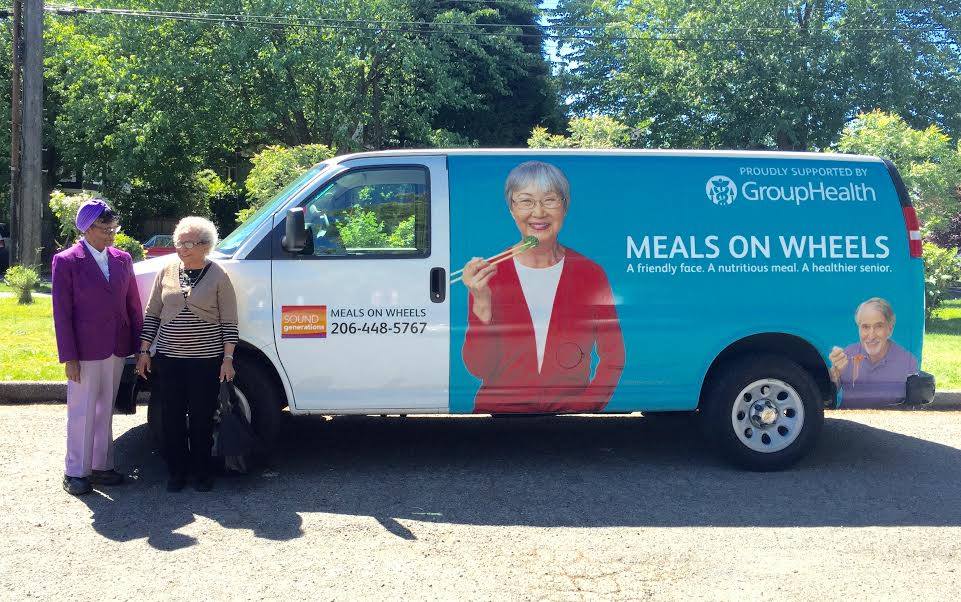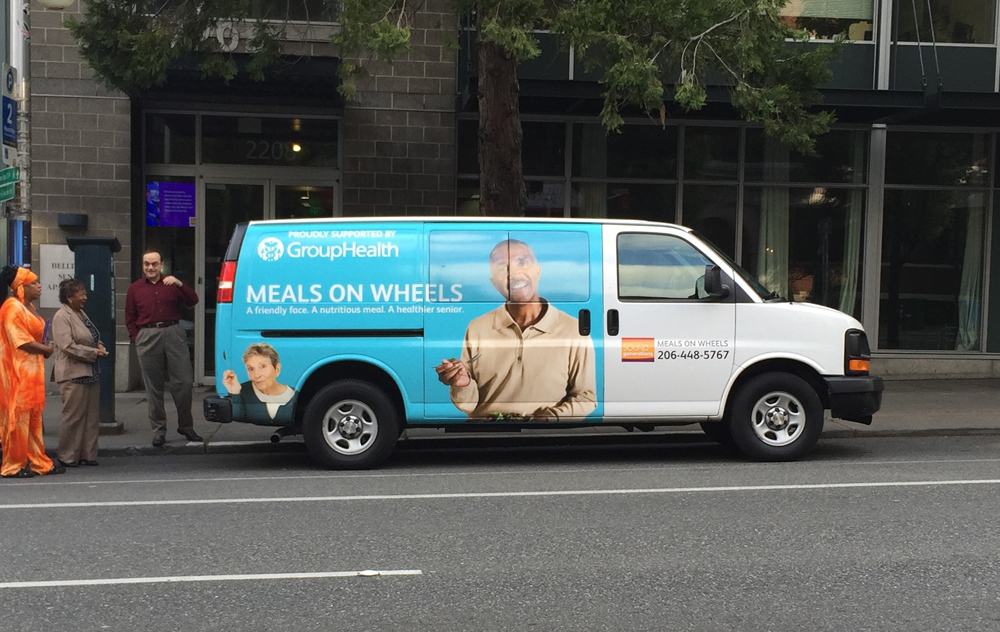By Tiffany Ran
Northwest Asian Weekly

Meals on Wheels van. (Photo provided by Sound Generations)
With the fast changing landscape of King County, one of the first questions Adam Porter and the staff at the local Meals on Wheels thought to ask local community organizations was, “How can our program be more relevant to the people you serve?”
From organizations like the Asian Counseling and Referral Service (ACRS) and Seattle Chinatown International District Preservation and Development Association (SCIDpda), the answer they got was: rice. For starters, Meals and Wheels should offer a side of rice with every meal, they said. It doesn’t matter if you’re having meatloaf and mashed potatoes — you need a side of rice.
They went forward with the rice, and clients could select it as a side in lieu of a dinner roll.
The side of rice took off and opened the door to additional feedback — the primary one being that the Asian style meals offered by Meals on Wheels were not very authentic.
“We were also told that delivering a frozen meal to someone is not very gracious, and there would be some shame because the family should be taking care of elders. You have a big white van that says ‘Meals on Wheels’ pull up with frozen foods being delivered and it’s not going to work,” said Porter, director of Nutrition and Community Dining at Meals on Wheels.
Meals on Wheels operates as a donation-based program offered through Sound Generation (formerly Senior Services). In 2015, Meals on Wheels delivered 436,828 meals to 2,528 clients in King County for a suggested donation of three dollars a meal. Current clients could select a maximum of 14 meals from a selection of over 35 dishes that include vegetarian, kosher, halal-certified, and now, in some cases, Asian meals through the new Asian cuisine pilot program.
“The whole reason for Sound Generation’s Meals on Wheels program, as well as our other programs, is to keep your mother and father in their own home as long as possible, and how do we do that? Nutrition, senior services, maybe social work, and volunteer transportation,” said Dale Hoover, who has done outreach for Meal on Wheels for nearly 11 years.

Meals on Wheels van. (Photo provided by Sound Generations.)
Hoover recalls the earliest conversations with Asian community outreach organizations and housing authorities in the International District that got the ball rolling. You and I could go to the Chinese restaurant across the street, he noted to other advocates. But many of their clients, for whom mobility is limited, cannot. He asked, “Wouldn’t it be nice to get something as close to the personal taste for Asian clients as possible?”
Meals on Wheels operates on donations, Hoover points out, but it doesn’t mean that clients have to accept whatever the organization decides to give. “We did this for you,” he said to a group of elderly residents in the International District with the help of a translator.
“The end of the story was this. I looked them in the eye and said, ‘We did this for you. We respect you and we wanted to do this for you,’ and when the interpreter said this to them, they all got up and clapped. It was so joyful,” said Hoover.
From these initial discussions, the team at Meals on Wheels worked to launch an Asian cuisine pilot program that would not only feature a selection of Asian dishes, but also Meals on Wheels information, services, and screenings in the required languages and dialects.
“As King County changes and becomes more culturally diverse, our program is trying to do a better job of reaching out to underserved communities. We’re primarily a program that is English speaking white folks trying to appeal to a broader range of clients, so that we’re meeting all the needs of King County, not just a certain segment,” said Porter.
The Asian cuisine pilot program is the first in King County where Meals staff trained and enable bilingual community advocates from a partnering organization to operate as a satellite Meals on Wheels, handling screening, meal orders, feedback, and meal production. The task is a great one for any nonprofit. Each meal from Meals on Wheels must satisfy a minimum of one-third of the recommended daily allowance of adult nutrition. The ability for the program to be available to more clients may be subject to space and budget. Currently, the Asian cuisine pilot program is available to a few select clients. The partnering organization has requested to remain anonymous while the program is in its pilot phase or until the Asian meals are more widely available.
“We’re taking it slowly because anything new with that kind of complexity will take some time to work out. It took us several years to figure out how to do it,” said Porter.
The next step may include outreach for community members to get involved in delivery and volunteers willing and able to serve the new demographic once Asian meals are more widely available, perhaps, Porter reckons, in the fall.
Tiffany Ran can be reached at info@nwasianweekly.com.



